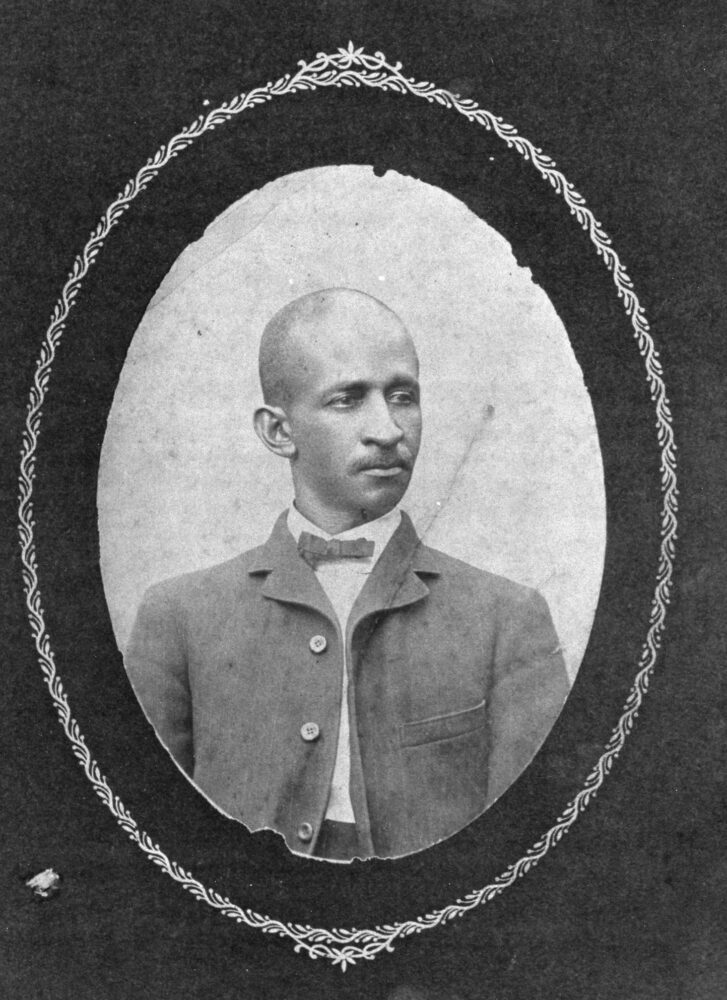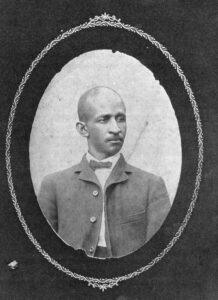C. C. Antoine
Caesar Carpentier “C. C.” Antoine served as Louisiana’s lieutenant governor from 1873 to 1877.
This entry is 7th Grade level View Full Entry

Northwest Louisiana Archives at LSU Shreveport
Caesar Carpentier “C. C.” Antoine, ca. 1873.
From 1873 to 1877 Caesar Carpentier “C. C.” Antoine served as Louisiana’s lieutenant governor. He was the third of three Black Republicans who held political office during Reconstruction. Never enslaved, Antoine was born in New Orleans in 1836 and raised in a family of free people of color. He was elected in 1872 on a ticket led by William Pitt Kellogg as the candidate for governor. Antoine was elected when Confederate veterans were disenfranchised, and the state was under federal control following the South’s loss in the Civil War. During this time people of African descent briefly held power in the highest offices in the state before the Compromise of 1877 ended Reconstruction and began the Jim Crow era.
What was C. C. Antoine’s early life like?
Antoine’s father was of African and European ancestry and a veteran of the 1815 Battle of New Orleans. His mother was born in the Caribbean and was the daughter of an African chief who had been sold into slavery. Antoine was privately educated in French and English in New Orleans before becoming a barber. After the Union capture of New Orleans in 1862, he organized a company of Black soldiers composed of both enslaved and free men of color, who joined the Northern forces. Antoine put the brigade together in a mere forty-eight hours. He was elected captain and led his troops in minor battles.
How did C. C. Antoine become involved in politics?
At the end of the Civil War Antoine immediately became involved in New Orleans political life. He served first as chairman of the Resolutions Committee for the Lincoln memorial program in 1865. The program, held in Congo Square, was used as a political rally in support of Louisiana’s return to the Union and was widely attended by people of African descent. That same year Antoine became associate editor of the Black Republican, a short-lived newspaper with a largely African American readership. (The name ‘Black Republican’ was chosen as a reference to Radical Republicanism, a political movement that sought to abolish slavery at the time.)
In 1866 Antoine moved to Shreveport where he established himself as a grocer. In Shreveport Antoine was deeply affected by the political instability and societal unrest of Reconstruction. His son Joseph Antoine was killed in a race riot before the national elections of 1868. In that same year Antoine was elected a state senator. During this time when former Confederates and southern white supremacists were excluded from government, the state legislature had 33 percent Black members in the House of Representatives and 20 percent in the Senate. In 1872 Antoine became lieutenant governor by popular vote, serving first under P. B. S. Pinchback, Louisiana’s only governor of African descent. Pinchback served as governor for thirty-five days between the impeachment of Governor Henry Clay Warmouth and the inauguration of William Pitt Kellogg. During the Battle of Liberty Place in New Orleans on September 14, 1874, a mob of white citizens tried to overthrow the government and remove Kellogg and his fellow Republicans. However, President Ulysses S. Grant ordered federal troops to restore order, and the Republican government remained in power.
What were C. C. Antoine’s accomplishments as an elected official?
Some historians believe Radical Republicans put many of Louisiana’s Black politicians in office during Reconstruction to establish a strong Republican Party in the state, rather than help emancipated Black people. That wasn’t the case with Antoine. Among both Black and white Republicans, there was corruption. Antoine, on the other hand, was considered trustworthy and a strong civic advocate for Shreveport. His efforts to clean up questionable practices in state government made enemies among his colleagues of both races. He opposed the notoriously corrupt Louisiana Lottery Company, from which many government officials skimmed money.
Antoine was a member of the constitutional convention that drafted the new state constitution in 1868. As a state senator in 1869, he sponsored a bill to establish the first charity hospital in Shreveport. Two years later he authored a bill to establish Shreveport as a city (it had been incorporated as a town in 1839 but didn’t acquire legal status as a city until Antoine’s bill was passed). Antoine drafted laws that created many of Shreveport’s government agencies, including the modern police department. Through his efforts, Shreveport’s first city hall was built in 1872 at the northwest corner of Milam and Louisiana Streets. Before the building’s construction, the mayor had to provide his own office space and other city offices were housed in rented spaces around town.
Antoine ran for lieutenant governor on the Republican ticket alongside Stephen B. Packard in 1876. The returning board declared Packard the winner. However, Democratic candidate Francis T. Nicholls, a Confederate veteran and double amputee, dismissed the official results of the election. The Republican government was overthrown by force after Nicholls seized the governor’s office. With a force of three thousand troops, Nicholls took the Cabildo in New Orleans, which was the headquarters of the Republicans. The Republicans immediately surrendered. Nicholls then dissolved the State Supreme Court and appointed a new judiciary, restoring “home rule” for the first time since the Civil War. Federal troops left Louisiana in 1877 as part of a national compromise that ended Reconstruction. Black Louisianans wouldn’t have full participation in Louisiana politics and government for nearly ninety years.
What did C. C. Antoine accomplish after the end of the Reconstruction period?
Once Reconstruction ended and white supremacists regained control of Louisiana, Antoine returned to Shreveport, where he was financially comfortable. As well as owning a grocery business, Antoine was a partner in a cotton brokering business in New Orleans, and for many years he owned a cotton plantation in Caddo Parish. He also made money speculating in real estate in the Allendale and West End neighborhoods of Shreveport and was president of the Cosmopolitan Life Insurance Company of Louisiana.
In 1887 Antoine co-founded and became vice president of the Comité des Citoyens, or Citizens Committee, an organization in New Orleans founded to fight against racial discrimination. The Comité was the successor to an organization known as the Unification Movement, which Antoine had co-founded in 1873. One of the first civil rights organizations in Louisiana, the Unification Movement was started by fifty white and fifty Black citizens with complete racial equality as its goal. The Comité des Citoyens had many of the same goals and much of the same leadership as the Unification Movement, though they were more proactive. The Comité was instrumental in the Plessy v. Ferguson Supreme Court case, which tested the constitutionality of Jim Crow legislation. In 1890 a light-skinned New Orleanian named Homer Plessy boarded a whites-only railcar in New Orleans. Plessy’s arrest and the subsequent series of trials that went to the Supreme Court resulted in the infamous Plessy v. Ferguson decision legalizing the doctrine of “separate but equal.” For Antoine and the Comité, the outcome of the case was seen as a defeat.
In 1892 District Attorney Charles A. Butler prosecuted Antoine in Orleans Parish Criminal Court for not telling a buyer about a lien on a property. Typically such an infraction wouldn’t lead to an arrest or a high-profile trial by the district attorney. However, Antoine’s prominence with the Comité des Citoyens and the Plessy case—at the time being heard in Orleans District Court where Butler’s assistant was prosecuting Plessy—made him a target. A minor real estate oversight that normally wouldn’t have been considered a crime was suddenly an excuse to give Antoine a criminal record.
How is Antoine remembered today?
On September 10, 1921, at the age of 85, Antoine died at his residence at 1941 Perrin Street in Shreveport’s Allendale section. Although he was an influential member of St. Paul’s Colored Methodist Episcopal Church, Antoine is buried in the New Bethlehem Baptist Church Cemetery. He is commemorated by C. C. Antoine Park on Milam Street in the Allendale area. Dedicated on May 26, 1984, a granite marker stands at the park’s center bearing a portrait of Antoine and a list of his political accomplishments. His Perrin Street home, Antoine’s sole surviving Louisiana residence, was entered into the National Register of Historic Places on August 20, 1999, but was lost to a fire in May 2022. Shreveport also hosts a C. C. Antoine Black History Month Celebration that began in 2008.
